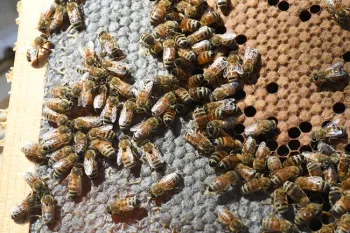UC Davis Class: On Becoming a Beekeeper

And that they did, under the tutelage and watchful eyes of Extension apiculturist Elina Lastro Niño, director of the California Master Beekeeper Program (CAMPB) and CAMPB educational supervisor Bernardo Niño, a staff research assistant in the E. L. Niño lab at the University of California, Davis.
The 23 participants in the short course, "Planning Ahead for Your First Hives," gathered at the Harry H. Laidlaw Jr. Honey Bee Research Facility on Bee Biology Road to spend a Saturday learning all about bees via lectures and hands-on activities.
They learned about honey bee biology, the components of a hive and where to place the hive. Then they donned bee veils and stepped outside to the apiary to learn hive inspection basics. They returned to the classroom for lunch and a Powerpoint presentation on "Keeping Bees Year-Around."
Highlights included opening a hive and engaging in queen wrangling, hands-on activities (holding a frame and identifying the queen, worker bees and drones), and varroa mite monitoring. The participants also examined several different types of the hives in the apiary, including the traditional Langstroth hive, Kenya top bar hive or horizontal top bar-hive, Warré hive and a flow hive. The short course ended with a session on "Save us from the hive intruders!" and a question-and-answer period.
CAMPB also hosted a short course the next day on "Working Your Colonies." Participants learned what is necessary to maintain a healthy colony. Lectures covered advanced honey bee biology, honey bee integrated pest management, and products of the hive. Participants also learned about queen wrangling, honey extraction, splitting/combined colonies, and monitoring for varroa mites.
Both courses drew maximum enrollment. "The classes were excellent," commented Wendy Mather, program manager of CAMPB. "We received really great feedback and the participants were thrilled to get the in-hive experience. And we got to sample some melipona honey (from stingless bees) from the Yucatán, as one of our participants had recently returned from a trip there."
The participants "now have some science-based knowledge and skills about honey bees and beekeeping that they can confidently share," Mather said.
Honey bee scientist Elina Lastro Niño, the statewide Extension apiculturist and member of the UC Davis Department of Entomology and Nematology faculty since 2014, conducts bee classes throughout much of the year. She is known for her expertise on honey bee queen biology, chemical ecology, and genomics. She holds a doctorate in entomology from Pennsylvania State University (PSU), where she served as a postdoctoral fellow in the lab of Christina Grozinger, director of the PSU Center for Pollinator Research.
The California Master Beekeeping Program uses science-based information to educate stewards and ambassadors for honey bees and beekeeping. Check the website schedule for classes or contact Mather at wmather@ucdavis.edu for more information.
